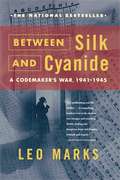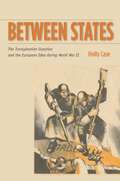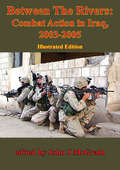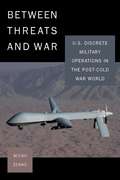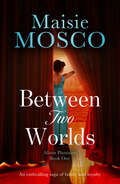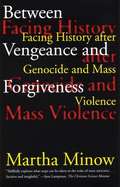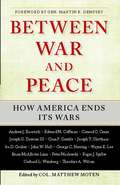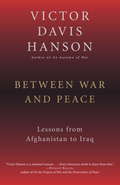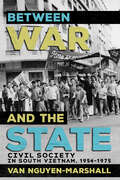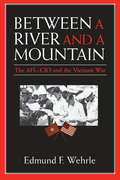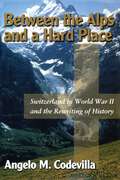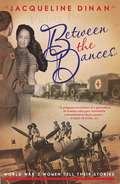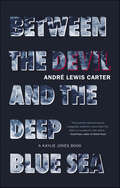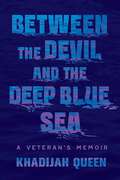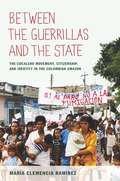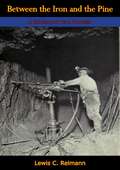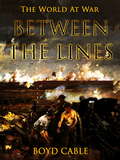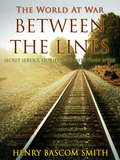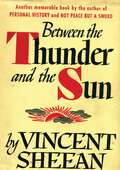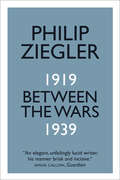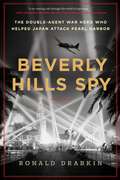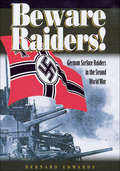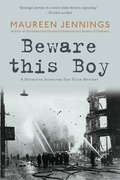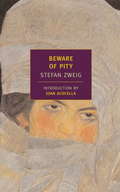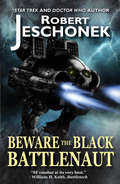- Table View
- List View
Between Silk and Cyanide: A Codemaker's War, 1941-1945
by Leo MarksLeo Marks, the head of Special Operations Executive, reveals many unknown truths about the Second World War in this memoir. Marks' ingenious work was to devise numeric codes printed on silk and to improve the security of the agent's codes. He played an important part in the deciphering of important enemy codes which culminated in the early end of the war.
Between States
by Holly CaseWinner of the 2010 George Louis Beer Prize of the American Historical Association. The struggle between Hungary and Romania for control of Transylvania seems at first sight a side-show in the story of the Nazi New Order and the Second World War. These allies of the Third Reich spent much of the war arguing bitterly over Transylvania's future, and Germany and Italy were drawn into their dispute to prevent it from spiraling into a regional war. But precisely as a result of this interaction, the story of the Transylvanian Question offers a new way into the history of how state leaders and national elites have interpreted what "Europe" means. Tucked into the folds of the Transylvanian Question's bizarre genealogy is a secret that no one ever tried to keep, but that has remained a secret nonetheless: small states matter. The perspective of small states puts the struggle for mastery among its Great Powers into a new perspective.
Between The Rivers: Combat Action In Iraq, 2003-2005 [Illustrated Edition]
by John J. McgrathIncludes nine maps and one photo illustrationFollowing World War II, the War Department Historical Division in 1946 published Small Unit Actions, the study of some discrete battles drawn from three different theaters of war...Nearly 20 years later, toward the end of American combat in Vietnam, the Office of the Chief of Military History again essayed to address small-unit actions with the publication of Seven Firefights in Vietnam.The present volume lies directly within the tradition of these predecessor works on small-unit actions. Since the fall of 2001, the U.S. Army, along with the other American armed services, has been engaged in military actions in Iraq and Afghanistan. Because the current conflict has so many different fronts and facets, no handful of small-unit case studies could do justice to such a complex tapestry of events. This book thus represents a volume that showcases the American soldier in combat operations within the context of the Global War on Terrorism/The Long War. This series of five case studies is drawn from events in Iraq. Four of the studies discuss combat operations within a counterinsurgency framework at the company and battalion levels. The final case study presents a deployment dilemma facing a brigade-level task force commander when he was asked to replace a whole division in the same geographical space. In each case, the story is derived from oral interviews and key documents and is fully annotated. The primary purpose for presenting these vignettes is to provide a vicarious education in what future participants will face as the War on Terrorism continues and beyond.
Between Threats and War: U.S. Discrete Military Operations in the Post-cold War World
by Micah ZenkoWhen confronted with a persistent foreign policy problem that threatens U.S. interests, and that cannot be adequately addressed through economic or political pressure, American policymakers and opinion formers have increasingly resorted to recommending the use of limited military force: that is, enough force to attempt to resolve the problem while minimizing U.S. military deaths, local civilian casualties, and collateral damage. These recommendations have ranged from the bizarre--such as a Predator missile strike to kill Zimbabwean President Robert Mugabe, or the assassination of Venezuelan President Hugo Chavez--to the unwise--the preemptive bombing of North Korean ballistic missile sites--to the demonstrably practical-air raids into Bosnia and Somalia, and drone strikes in Yemen and Pakistan. However, even though they have been a regular feature of America's uses of military force through four successive administrations, the efficacy of these "Discrete Military Operations" (DMOs) remains largely unanalyzed, leaving unanswered the important question of whether or not they have succeeded in achieving their intended military and political objectives. In response, Micah Zenko examines the thirty-six DMOs undertaken by the US over the past 20 years, in order to discern why they were used, if they achieved their objectives, and what determined their success or failure. In the process, he both evaluates U.S. policy choices and recommends ways in which limited military force can be better used in the future. The insights and recommendations made by Zenko will be increasingly relevant to making decisions and predictions about the development of American grand strategy and future military policy.
Between Two Worlds (The Alison Plantaine Sagas)
by Maisie MoscoA young girl is drawn to her dramatic family heritage in the first Alison Plantaine saga from the author of Almonds and Raisins. Alison Plantaine was born to the theatre. As a child the life she knew was one of backstage dramas and highly-charged emotions. The desire to perform is in her Plantaine blood. But when Alison learns about her secret heritage it makes her question the path she has chosen. Meanwhile, tastes are changing and the family passion for acting is losing touch with trends. A war is breaking out and Alison senses change in the air. Her mother is a gifted actress and wants her daughter to follow in her footsteps. Her father, shrewd and practical, understands that his daughter&’s respect for family tradition must not stifle her talent and the promise of success. But the decision must be Alison&’s and she becomes torn between duty and heritage, or the life she always dreamed of on the stage. A vivid and emotional family saga from a much-loved author, perfect for fans of Rita Bradshaw and Margaret Dickinson. Praise for the writing of Maisie Mosco &“Once in every generation or so a book comes along which lifts the curtain.&” —The Guardian &“Full of freshness and fascination.&” —Manchester Evening News &“The undisputed queen of her genre.&” —The Jewish Chronicle
Between Vengeance and Forgiveness: Facing History after Genocide and Mass Violence
by Martha MinowThis is a book on justice and healing after horrific violence. Remembering and forgetting, judging and forgiving, reconciling and avenging, grieving and educating - the author Martha Minow shows us why each may be necessary, yet painfully inadequate, as individuals and societies confront past horrors.
Between War and Peace
by Col. Matthew MotenAn emperor bows abjectly before his conquerors on the deck of a battleship. As smoke yet rises from a bloody battlefield, a dejected general proffers his sword to his victorious opponent. Frock-coated ministers exchange red leather-bound treaty books in the Hall of Mirrors at Versailles. These are iconic images of war's end, but even when they are historically accurate, they conceal more than they convey. Not all wars end decisively. Indeed, the endings of most wars are messy, complicated, inconclusive, and deeply intriguing. As the United States attempts to extricate itself from two long and costly wars in Iraq and Afghanistan, nothing could be more relevant than a look back at the ways America has ended its major conflicts in the past. It is a topic that has been curiously overlooked. Edited and with an introduction by Col. Matthew Moten, a professor of history at West Point, Between War and Peace explores the endings of fourteen American wars, from the Revolution to the first Gulf War. Here, with incisive insight, narrative flourish, and strategic detail, some of America's leading historians examine the progress of America's wars: their initial aims--often quite different from their ends--their predominant strategies, their final campaigns, the painful journeys out of war, and the ramifications of the wars' ends for the nation's future. This timely and important book confronts one of the most pressing issues of our time: how do we end conflict and how do we deal with the country we are leaving behind? As recent history has shown, an "exit strategy," though it's sometimes neglected, can be as important a piece of military strategy as any. Taken together, these essays break new historical and theoretical ground, building on our current understanding of America's history in ways that few studies have done before. A formidable enterprise of historical collaboration, Between War and Peace takes readers inside the climactic moments of America's wars, offering a penetrating look at the past in hopes of illuminating future debates that will determine the nation's course between war and peace.
Between War and Peace: Lessons from Afghanistan to Iraq
by Victor Davis HansonHanson examines the world's ongoing war on terrorism, from America to Iraq, from Europe to Israel, and beyond. In direct language, Hanson portrays an America making progress against Islamic fundamentalism but hampered by the self-hatred of elite academics at home and the cynical self-interest of allies abroad. He sees a new and urgent struggle of evil against good, one that can fail only if "we convince ourselves that our enemies fight because of something we, rather than they, did." Whether it's a clear-cut defense of Israel as a secular democracy, a denunciation of how the U.N. undermines the U.S., a plea to drastically alter our alliance with Saudi Arabia, or a perception that postwar Iraq is reaching a dangerous tipping point, Hanson's arguments have the shock of candor and the fire of conviction.
Between War and the State: Civil Society in South Vietnam, 1954–1975
by Van Nguyen-MarshallIn Between War and the State, Van Nguyen-Marshall examines an array of voluntary activities, including mutual-help, professional, charitable, community development, student, women's, and rights organizations active in South Vietnam from 1954 to 1975. By bringing focus to the public lives of South Vietnamese people, Between War and the State challenges persistent stereotypes of South Vietnam as a place without society or agency. Such robust associational life underscores how an active civil society survived despite difficulties imposed by the war, government restrictions, economic hardship, and external political forces. These competing political forces, which included the United States, Western aid agencies, and Vietnamese communist agents, created a highly competitive arena wherein the South Vietnamese state did not have a monopoly on persuasive or coercive power. To maintain its influence, the state sometimes needed to accommodate groups and limit its use of violence. Civil society participants in South Vietnam leveraged their social connections, made alliances, appealed to the domestic and international public, and used street protests to voice their concerns, secure their interests, and carry out their activities.
Between a River and a Mountain: The AFL-CIO and the Vietnam War
by Edmund F. WehrleBetween a River and a Mountain details American labor's surprisingly complex relationship to the American war in Vietnam. Breaking from the simplistic story of "hard hat patriotism," Wehrle uses newly released archival material to demonstrate the AFL-CIO's continuing dedication to social, political, and economic reform in Vietnam. The complex, sometimes turbulent, relationship between American union leaders and their counterparts in the Vietnamese Confederation of Labor (known as the CVT) led to dangerous political compromises: the AFL-CIO eventually accepted much-needed support for their Vietnamese activities from the CIA, while the CVT's need to sustain their relationship with the Americans lured them into entanglements with a succession of corrupt Saigon governments. Although the story's endpoint--the painfully divided and weakened labor movement of the 1970s--may be familiar, Wehrle offers an entirely new understanding of the historical forces leading up to that decline, unraveling his story with considerable sophistication and narrative skill.
Between the Alps and a Hard Place: Switzerland in World War II and the Rewriting of History
by Angelo M. CodevillaBetween the Alps and a Hard Place: Switzerland in World War II and the Rewriting of History by Angelo M. Codevilla
Between the Dances
by Jacqueline DinanThe start of World War 2 changed women's lives and their place in Australian society forever. Thousands of women ventured where few had gone before - into the services and workplaces previously considered the sole preserve of men. In preparation for her book Between the Dances, Jacqueline Dinan, interviewed over three hundred women around Australia to collect the last first hand stories from World War 2. Revealing poignant and personal conversations, photographs and letters, Between the Dances is a testament to real life during World War 2. From Malta to Australia, New Zealand to the UK, the challenges and adventures faced by these women were unprecedented. Their passion, courage, resilience and commitment during wartime were all a precursor to the astonishing changes brought about by this incredible generation. For the first time, women were doing their bit as nurses in war zones, members of the services, farmhands, factory workers or volunteers in community service. The last tradition left was the weekly dance, which ceremoniously brought these courageous women and men together for a quickstep, fox trot and brief respite from the rigours of wartime. The accounts are enhanced by poignant, amusing and insightful anecdotes along with scores of previously unpublished and unique photographs from personal albums. Jacqueline's former experience was in corporate and art communications and events, before she embarked on her own public relations and events business. Now a regular speaker with the Country Women's Association, Australian Rotary Clubs, Legacy, Red Cross and Memorial groups, Jacqueline has become a well-known figure amongst The Returned & Services League of Australia.
Between the Devil and the Deep Blue Sea: A Novel
by André Lewis CarterIn the early 1970s, César Alvarez enlists in the navy to escape a life of crime; while the decision saves him from the streets, it also lands him amid volatile racial tensions at a crucial moment in US history. "Skillfully blending his fictional hero’s coming-of-age story with a real-life racial confrontation aboard ship, Carter’s tale is a winning combination of military procedural, suspense, and Black history." —Booklist, Starred Review "Taking its title from a nautical term for a conundrum, the novel is a coming-of-age and redemption story about two young Black men going through boot camp, training school and their first assignments in an early 1970s Navy struggling with racism and sexism." —The Oregonian The Vietnam War is raging, the US Navy has only recently begun the process of integration, and the country is reeling from racial turmoil and unrest. So why does César, a street-tough kid of Afro-Cuban descent, enlist in the navy? He is on the run from a life of crime and from Mr. Mike, a charismatic, sociopathic gangster who was once a mentor but has now turned on him. Escaping into a navy wrestling with its history of racism and sexism, César soon sees the absurdity of certain prejudices that seem as old as the US Armed Forces. When he is deployed aboard the USS Kitty Hawk, racial tensions are high and are moving quickly toward violence. Through it all, César’s ever-growing sense of honor and self-worth force him to make moral decisions he never knew he was capable of. It’s a fortitude he will desperately need.
Between the Devil and the Deep Blue Sea: A Veteran's Memoir
by Khadijah QueenFrom award winning poet Khadijah Queen, a coming-of-age memoir about family, survival, and one servicewoman&’s search for autonomy. Yanked out of college and torn from her sunny hometown of Los Angeles in the early 1990s, Khadijah Queen finds herself sharing a basement apartment with her mother and sister and working two retail jobs in snowy, tiny Inkster, Michigan. Longing to escape the cycle of her family&’s poverty, incarceration, and addiction, she joins the US Navy, determined to earn money to finish college and make it back to L.A. on her own terms. But soon after Queen completes her grueling training and boards a doomed destroyer, she finds herself faced with near-constant sexual harassment, demeaning labor assignments, and overt racism. Stuck on a ship with nowhere to hide, she looks to poetry, literature, and letters from home to get through the long days and maintain her dignity. She keeps her head down until the workplace hostility against women spills over into her dating life and threatens to derail everything she has worked for. In trying to break through the unspoken code of silence between sailors, Queen must decide where her loyalties lie: with the Navy or within herself. Unflinching and masterfully penned, this memoir questions the promises of service to reveal the true price of being a woman at sea.
Between the Guerrillas and the State: The Cocalero Movement, Citizenship, and Identity in the Colombian Amazon
by Andy KlattResponding to pressure from the United States, the Colombian government in 1996 intensified aerial fumigation of coca plantations in the western Amazon region. This crackdown on illicit drug cultivation sparked an uprising among the region's cocaleros, small-scale coca producers and harvest workers. More than 200,000 campesinos marched that summer to protest the heightened threat to their livelihoods. Between the Guerrillas and the State is an ethnographic analysis of the cocalero social movement that emerged from the uprising. Mara Clemencia Ramrez focuses on how the movement unfolded in the department (state) of Putumayo, which has long been subject to the de facto rule of guerrilla and paramilitary armies. The national government portrayed the area as uncivilized and disorderly and refused to see the coca growers as anything but criminals. Ramrez chronicles how the cocaleros demanded that the state recognize campesinos as citizens, provide basic services, and help them to transition from coca growing to legal and sustainable livelihoods.
Between the Iron and the Pine: A Biography of a Pioneer
by Lewis C. ReimannWhen a Chicago financier was invited in the early Eighties to invest his money in the infant iron mining and lumber industries of Iron County of the Upper Peninsula of Michigan, he sniffed:—“Iron County? Hell, it’s too far away from anywhere to ever amount to anything”Little did this man of money expect that the giant white pine of that virgin land would go into the building of most of the homes of his native Chicago and other thriving young cities of the middle west. Nor that the iron ore dug from its fabulously rich mines result in the defeat of the Kaiser and Hitler. He had no way of knowing Iron River was to be the home of Carrie Jacobs Bond whose songs were to be sung the world over. Nor that I, one of the Reimann Baker’s Dozen, would write this saga of the North seventy years after he made his brash statement.How did all this come about? How did this backwoods community, hidden in the dark pine-covered hills in that far-away land, become a great factor in the building of this nation?Well, here is the tale, written in a distant city by the author as he sits before his fireplace recalling his boyhood days at the turn of the Century.
Between the Lines (The World At War)
by Boyd CableThis book has been written at the Front within sound of the German guns and for the most part within shell and rifle range It is an attempt to tell something of the manner of struggle that has gone on for months between the lines along the Western Front in WW I.
Between the Lines / Secret Service Stories Told Fifty Years After: Secret Service Stories Told Fifty Years After (The World At War)
by Henry SmithFor those interested in the nitty gritty of the Civil War. It is hard to imagine living at a time and in a place where you were not sure where you and your friends stood. (Excerpt from Goodreads)
Between the Thunder and the Sun: A Correspondent’s View of War
by Vincent Sheean“He's done it again, this author of Personal History and Not Truth but a Sword. In a sense this is quite different. It has the same quality of immediacy, the same sureness of foresight, the same gift for being at the right place at the right time (for a correspondent, that is—though he probably curses his missing Pearl Harbor by inches); once again he shows his ability to blend fast paced adventure with human bits of anecdote and by-paths of quiet descriptive writing. Where then is this different? There is more analysis of mood and emotional values, of the whys and hows before the events; there are more sharp contrasts. The opening chapters seem to find him audience to the fiddling while Rome burned-albeit with full and angry awareness of the burning. An idyll of a Salzburg Festival, of holidays on the Riviera—and then the sweep of events, from 1937 onto a post mortem on Pearl Harbor, all recorded with vigor and color, and an occasional whirl for the socialites.”-Kirkus ReviewsThis volume was compiled when the author was a civilian journalist in Europe and Southeast Asia. He then joined the military and was a major in the Army Air Force at the time of this book's publication.
Between the Wars: 1919-1939
by Philip ZieglerAt the end of 1918 one prescient American historian began to write a history of the Great War. "What will you call it?" he was asked. "The First World War" was his bleak response. In Between the Wars Philip Ziegler examines the major international turning points - cultural and social as well as political and military - that led the world from one war to another. His perspective is panoramic, touching on all parts of the world where history was being made, giving equal weight to Gandhi's March to the Sea and the Japanese invasion of China as to Hitler's rise to power. It is the tragic story of a world determined that the horrors of the First World War would never be repeated yet committed to a path which in hindsight was inevitably destined to end in a second, even more devastating conflict.
Beverly Hills Spy: The Double-Agent War Hero Who Helped Japan Attack Pearl Harbor
by Ronald Drabkin"A beguiling tale of espionage and double-dealing in the years leading up to World War II. ... Strap in for a narrative that demands a suspension of disbelief—and richly rewards it." —Kirkus Reviews (starred review); Best Books of February SelectionThe untold story of the World War I hero who became a fixture of high society in Golden Age Hollywood—all while acting as a double agent for the Japanese Empire as it prepared to attack Pearl HarborFrederick Rutland’s story is a rags-to-riches coup for the ages—a lower-class boy from England bootstraps his way up the ranks of the British military, becoming a World War I pilot, father of the modern aircraft carrier, cosmopolitan businessman, and Hollywood A-list insider. He oversaw this small empire from his mansion on the fabled Bird Streets of Beverly Hills. Snubbed for promotion in the Royal Air Force due to little more than jealousy and class politics, Rutland—to all appearances—continued to spin gold from straw, living an enviably lavish lifestyle that included butlers, wild parties, private clubs, and newsworthy living . . .. . . and it was all funded by the Japanese Empire.Beverly Hills Spy reveals the story of Rutland’s life of espionage on behalf of the Axis, selling secrets about fleet and aircraft design to the Japanese Imperial Navy that would be instrumental in its ability to attack Pearl Harbor, while collecting a salary ten times larger than the best-paid Japanese admirals. Based on recently declassified FBI files and until-now untranslated documents from Japanese intelligence, Ronald Drabkin brings the scope of this unforgettable tale into full focus for the first time. Rutland hides in plain sight, rubbing elbows with Amelia Earhart and hosting galas and fundraisers with superstars like Charlie Chaplin and Boris Karloff, while simultaneously passing information to Japan through spy networks across North and Central America. Countless opportunities to catch Rutland in the act are squandered by the FBI, British Intelligence, and US Naval Intelligence alike as he uses his cunning and charm to misdirect and cast shadows of doubt over his business dealings, allowing him to operate largely unfettered for years.In the end, whether he fully intends to or not, Rutland sets in motion world events that are so monumental, their consequences are still being felt today. Beverly Hills Spy is a masterpiece of research on spy craft, a shocking narrative about an unknown but pivotal figure in history, and brings new information to light that helps us understand how Pearl Harbor happened—and how it could have been prevented.
Beware Raiders!: German Surface Raiders in the Second World War
by Bernard EdwardsA British naval historian recounts the victories and defeats of two of the most infamous German Navy vessels during World War II. Bernard Edwards&’s Beware Raiders! tells the fascinating story of two German ships and the havoc they caused amongst Allied shipping in World War II. One was the eight-inch gun cruiser Admiral Hipper—named for World War I&’s German fleet Admiral Franz von Hipper—fast, powerful, and Navy-manned. The other was a converted merchant man, Hansa Line&’s Kandelfels armed with a few old scavenged guns manned largely by reservists, and sailing under the nom de guerre Pinguin. The difference between the pride of the Third Reich&’s Kriegsmarine&’s fleet and the converted cruiser was even more evident in their commanders. Edwards emphasizes the striking contrast between the conduct of Ernst Kruder, captain of the Pinguin, who attempted to cause as little loss of life as possible, and the callous Iron Cross–decorated Wilhelm Meisel of the Admiral Hipper, who had scant regard for the lives of the men whose ships he had sunk. Contrary to all expectations, as Edwards reveals in his thrilling accounts of the missions performed by each ship, the amateur man-of-war reaped a rich harvest and went out in a blaze of glory. The purpose-built battlecruiser, on the other hand, was hard-pressed even to make her mark on the war and ended her days in ignominy.
Beware This Boy
by Maureen JenningsNovember, 1940. Tom Tyler, Detective Inspector of the small Shropshire town of Whitchurch, is a troubled man. The preceding summer had been a dark one for Britain, and even darker for Tom's own family and personal life. So he jumps at the opportunity to help out in the nearby city of Birmingham, where an explosion in a munitions factory has killed or badly injured several of the young women who have taken on dangerous work in support of the war effort.At first, it seems more than likely the explosion was an accident, and Tom has only been called in because the forces are stretched thin. But as he talks to the employees of the factory, inner divisions -- between the owner and his employees, between unionists and workers who fear communist infiltration -- begin to appear. Put that together with an AWOL young soldier who unwittingly puts all those he loves at risk and a charming American documentary filmmaker who may be much more than he seems, and you have a page-turning novel that bears all the hallmarks of Maureen Jennings' extraordinary talent: a multi-faceted mystery, vivid characters, snappy dialogue, and a pitch-perfect sense of the era of the Blitz, when the English were pushed to their limits and responded with a courage and resilience that still inspires.
Beware of Pity
by Stefan Zweig Trevor Blewitt Joan Accocella Phyllis BlewittThe great Austrian writer Stefan Zweig was a master anatomist of the deceitful heart, and Beware of Pity, the only novel he published during his lifetime, uncovers the seed of selfishness within even the finest of feelings.Hofmiller, an Austro-Hungarian cavalry officer stationed at the edge of the empire, is invited to a party at the home of a rich local landowner, a world away from the dreary routine of the barracks. The surroundings are glamorous, wine flows freely, and the exhilarated young Hofmiller asks his host--s lovely daughter for a dance, only to discover that sickness has left her painfully crippled. It is a minor blunder that will destroy his life, as pity and guilt gradually implicate him in a well-meaning but tragically wrongheaded plot to restore the unhappy invalid to health.
Beware the Black Battlenaut
by Robert T. Jeschonek Ben BaldwinAll-out war engulfs a distant quadrant of space. Hardcore warriors clash in high tech Battlenaut armor, pitting the ultimate fighting machines in epic struggles on a planetary scale. In the heart of this raging hell, the sleep-deprived Redeye squad fights harder than anyone. Pumped up on drugs, wired to the max, the Redeyes tear through enemy forces like berserk Vikings. But fatigue takes a toll, as the Redeyes start to see things that don't exist. And something that might exist after all--a terrible harbinger of doom, a legendary herald of the end of all things. Does the Black Battlenaut truly tower over the blood-soaked war zone? Is it a nightmare brought on by exhaustion, or an omen of infinite devastation? Either way, the Redeyes set out to stop it by any means necessary...even if their private war requires the ultimate sacrifice and more. Don't miss this exciting tale by award-winning storyteller Robert T. Jeschonek, a master of hard-hitting science fiction that really packs a punch."Robert Jeschonek is a towering talent..." - Mike Resnick, Hugo and Nebula Award-winning author of the Starship series.
